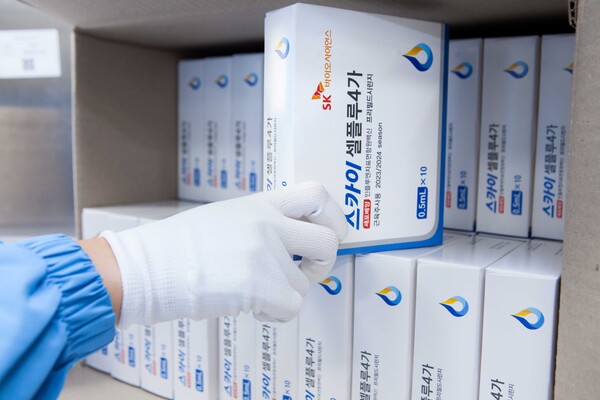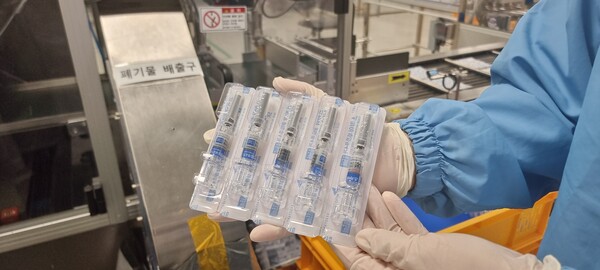ANDONG -- SK bioscience said its self-developed cell-cultured flu vaccine, SKY Cellflu Quadrivalent Prefilled Syringe, has obtained national distribution approval finalizing its process for market introduction in Korea this year.

SK bioscience had previously suspended production of SKY Cellflu for the past two years to ensure a smooth supply of SKYCovione, its Covid-19 vaccines.
However, with the Covid-19 outbreak entering an endemic phase, SK bioscience has resumed production of SKY Cellflu in anticipation of a sharp increase in the incidence of flu this year along with the lifting of social distancing and indoor masks.
The vaccines will be shipped from the company's manufacturing facility, Andong L House, located in Andong, North Gyeongsang Province, from Wednesday.
SK bioscience plans to supply approximately 5 million doses of the influenza vaccine in Korea until early next year, and the vaccine will be available for administration in hospitals and clinics from next month.
According to the company, SKY Cellflu is Korea's first influenza vaccine to achieve the WHO's Pre-qualification (PQ) certification and is the only cell-cultured-based influenza vaccine available in Korea.
Aside from SKY Cellflu, all other vaccines used in Korea are produced using egg-based methods, which cultivate the virus in fertilized eggs.
"As the cell-culture method does not utilize eggs, it is a relatively safer option for those with egg allergies," the company said. "Also, compared to the egg-based production, the cell-cultured process has a shorter production time, allowing for rapid production during an influenza outbreak."
The advanced aseptic culturing equipment used in the cell-cultured approach also eliminates the need for antibiotics and preservatives, and experts suggest that not using these additional ingredients reduces the likelihood of allergic reactions post-vaccination, it added.
The company stressed that another beneficial factor of using the cell-cultured approach is its efficacy consistency.
"Typically, flu vaccines are produced annually based on the WHO's predicted list of prevalent influenza strains for that year," the company said. "However, the possibility of virus mutation during the egg-based vaccine production is relatively higher, while cell-cultured vaccines tend to have a lower chance of mutation from the actual prevalent virus strains."
Studies abroad have also confirmed that vaccines produced using the cell-cultured methods have a lower potential for mutation, ensuring more consistent efficacy, it added.
The company provided data from the U.S. Food and Drug Administration and the U.S. Centers for Disease Control and Prevention that compared the egg-based vaccine with the cell-cultured vaccine from 2017-2018 as an example.
"The results showed that the cell-cultured quadrivalent flu vaccine showed an 11 percent higher efficacy in preventing influenza-realted hospital encouters compared to its egg-based counterpart," SK bioscience said. "Following these results, the U.K.'s Joint Committee on Vaccination and Immunisation recently released guidelines recommending the quadrivalent cell-cultured influenza vaccine for those aged two to 64."

SK bioscience's Andong L House General Manager Lee Sang-gyun also stressed that cell-cultured influenza vaccines will become the new normal for influence vaccines in the near future.
"The WHO had already forecasted the shift from egg-based flu vaccines to cell-cultured ones back in the 2000s," Lee said. "However, various vaccine makers, including multinational pharmaceutical giants like Sanofi and GSK, have yet to transition to cell-cultured production due to the immense costs involved in altering their substantial pre-existing infrastructure, which is focused on the egg-based method."
In this light, SK bioscience, being a latecomer, had the advantage of directly adopting the cell-cultured technique from the start, Lee added.
Lee also stressed that while some foreign companies succeeded in acquiring cell-cultured technology, they failed to commercialize due to yield issues.
"SKY Cellflu embodies the advanced vaccine technology of Korea," Lee said. "Through its reintroduction to the market, it will broaden the vaccine choices for our citizens and reassert our vaccine's competitiveness in the global market."
Related articles
- JW Shinyak to resume marketing of SK bioscience’s flu vaccine
- SK bioscience, GC go head-to-head to expand influenza vaccine market share
- SK bioscience strikes deal with Serbian gov’t to establish vaccine localization partnership
- SK bioscience seeks emergency use of updated Novavax Covid-19 vaccine in Korea
- SK bioscience, Hilleman Laboratories join forces to develop low-cost Ebola vaccine

